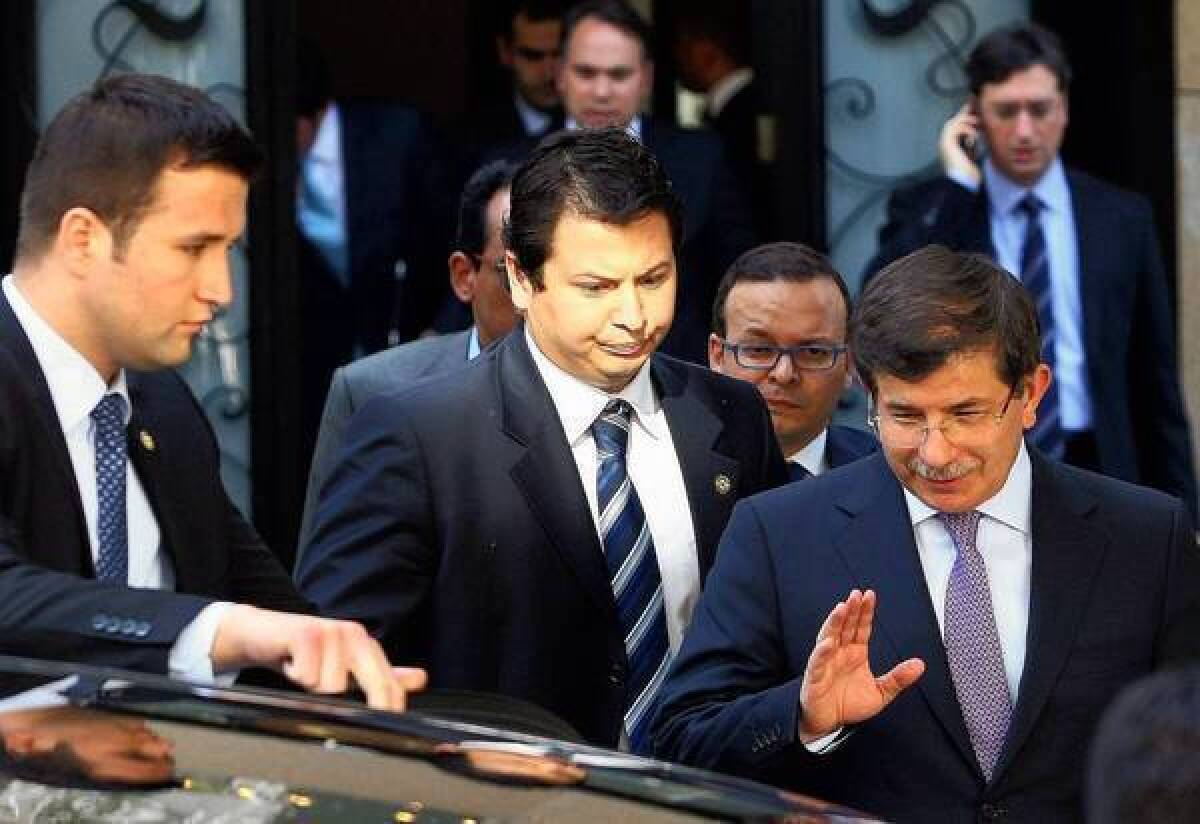Syria, Turkey mount joint rescue for downed jet’s pilots

BEIRUT — A day after Syria shot down a Turkish jet, officials from the neighboring countries moved to tamp down tensions Saturday as they mounted a joint rescue operation for two pilots still missing in the eastern Mediterranean.
The incident dramatically escalated tensions between two countries whose relations were already severely strained because of Turkey’stacit support of the 16-month uprising against Syrian President Bashar Assad.
But there was a notable lack of bellicose rhetoric Saturday emanating from both capitals, Ankara and Damascus, underscoring the explosive potential of the incident.
Turkish President Abdullah Gul conceded Saturday that the F-4 Phantom aircraft downed Friday off the Syrian coast, apparently by a surface-to-air missile, may have wandered into Syrian airspace, but he said any such action was not “ill-intentioned” and was not unusual.
“We will wait to clarify some details, and then of course everything that needs to be done will be done,” Gul told reporters.
Turkey has said it would act “with determination” once the facts were clarified.
Turkey is a NATO member and was probably consulting the United States and other allies before deciding how to respond. But there was no public indication that Turkey was seeking support from North Atlantic Treaty Organization allies for retaliatory action.
Russia, a close ally of the Syrian government, will also be watching closely. Moscow has said it opposes any foreign intervention in the Syrian conflict, which has left at least 10,000 people dead, as the nation plunges toward a sectarian-tinged civil war.
Diplomats have been extremely concerned about the possible “spillover” effect in neighboring nations, including Turkey, Lebanon and Jordan. On Thursday, a Syrian pilot defected to Jordan with his MIG-21 aircraft.
Turkish authorities were said to be studying the doomed F-4 Phantom’s flight path in a meticulous effort to conclude whether it was in Syrian airspace when it was shot out of the sky. The outcome seemed likely to color Ankara’s response.
Syria’s official state news agency reported that air defenses shot the aircraft down when it was less than a mile from the Syrian coast, well within domestic airspace.
A war between the two nations — both with huge armies, modern air forces and considerable missile-launching capabilities — would probably create massive instability in one of the world’s most volatile regions.
But the overall tone of the Turkish response did not suggest that Ankara regarded the incident as a justification for war. Turkish public opinion also seemed muted, though there was some saber-rattling in the Turkish press.
On the Syrian side, a Foreign Ministry spokesman took the unusual step of calling a Turkish television channel and reassuring the Turkish people directly that the incident was an “accident” and not an act of aggression.
“There was no hostile act against Turkey whatsoever,” Syrian Foreign Ministry spokesman Jihad Makdissi told Turkey’s A Haber television news channel, according to a translation provided by the station and quoted by the Associated Press. “What is important now is that Turkey and Syria are working together to find the pilots.”
Search vessels from the two nations were said to be scouring the area where the jet was thought to have plunged into the Mediterranean. There were no reports of wreckage having been recovered.
Among the many unanswered questions was what the U.S.-made jet was doing so close to the Syrian coast, and whether it had strayed there inadvertently or was there for a specific purpose.
The Turkish Foreign Ministry is expected to release a more detailed statement Sunday.
The incident did put foreign powers on notice that Syria’s Russian-made air defenses remain capable of defending its borders. Washington and other Western nations have so far ruled out a Libya-style intervention in Syria, but Western military planners have been examining the options.
Before the outbreak of the Syrian rebellion, Syria and Turkey were close allies that had even mounted joint military exercises. The 500-mile Turkish-Syrian border was a hub for international trade. The Syrian uprising, however, has strained relations to something close to a breaking point. Each nation has expelled the other’s diplomats, and both sides have exchanged verbal broadsides. The border has become a tinderbox.
Turkey has joined the United States and other nations in calling on Assad to step down. A mutual animosity appears to have developed between Assad and Turkish Prime Minister Recep Tayyip Erdogan, who once regarded the Syrian leader as a friend.
More than 30,000 Syrian refugees have fled into Turkey and are living mostly in border-area camps. Damascus has charged that insurgents and arms are flowing into Syria through the porous frontier. Several cross-border shooting incidents — including one in April that left two dead on the Turkish side — have drawn angry condemnations from Ankara.
Turkey is hosting both a major Syrian rebel umbrella group, the Free Syrian Army, and several political opposition coalitions, including the best-known faction, the Syrian National Council. But Turkey has denied reports that it is supplying arms to Syrian rebels or facilitating arms transfers.
More to Read
Sign up for Essential California
The most important California stories and recommendations in your inbox every morning.
You may occasionally receive promotional content from the Los Angeles Times.







